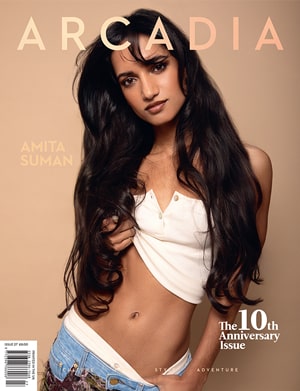Clara’s Biography:
Clara Watt is a London-based documentary photographer. Originally from Switzerland, Canada and Senegal, she started #theHAIRportraits to document the wide spectrum of black hair, and the experiences of men, women and gender non-binary people navigating the politics of living with black hair. It’s her hope that these portraits spark conversations about long-standing euro-centric beauty standards, but above all, that it gives some of you the confidence to explore your own relationship with black hair (whether you have black hair or not, it’s just as important!). At the end of the day, hair is hair and it shouldn’t define who we are as humans. Unfortunately, that’s not a reality for the black community…yet. Until then, this series will offer knowledge, hope and a place for our voices to be heard.
Amelia
“I once had a weave… it didn’t go well. My scalp couldn’t breathe. I had it as a bob cut, so I looked like a ‘Karen’. I thought ‘well I paid for it, I may as well wear it’, but I remember my mom coming after me with a pair of scissors going ‘we’re cutting it out, it’s terrible!”
At its current stage, I don’t like my hair. I love colored hair – when people dye it all the shades of the rainbow. I wanted that. I bleached it, it was meant to be blush pink. It was also silver at one point but my mom said I looked like an old woman so I dyed it again. I wish it would sprout back to what it was before.
My mother’s white, and my mum loves my hair when it’s fluffy. She used to puff it up and stick a bow in front of it. she thought it was amazing. I looked like a Bishon Frise. Everyone wanted to touch it, because they had never seen it before, since it was just the three of us in school. I’m used to being different and the only black person in a crowd.
I can make my curls more defined, it just takes so long and requires me twirling each curl around my finger. When I was younger my mom would do it for me, but it had to be done in the morning, because if I slept on it, it would flatten the curls. So I remember waking up at the crack of dawn to curl each strand on my head. People wake up that early to do their make-up for the day, I’d have to do it to not look like a pom-pom.
The last place I worked, this girl from Guadeloupe was like “oh! now I have someone to speak to about hair!” and I was like “I don’t know anything about hair”. She thought because I was black that I should know everything there is to know about how to manage black hair. I was raised by a white woman.”
Ami (my younger sister)
“I don’t consider myself as someone who believes that the outside reflects the inside, or vice versa. I’ve always believed that what I looked like on the outside never had any bearing or influence on my identity, and that included my hair. Although, I do somewhat feel the pressures of society to look a certain way. If I truly stopped caring, my hair would be out in its most natural form. Maybe in a way, that’s a reflection of my identity?”
“I started noticing my friends hair before my own. I think this caused me to not like my own very much, because I didn’t have any friends with my type of hair. I also thought something was wrong with my hair because my sister had much longer and looser curls than I did. When I started to pay attention, all I wanted was straight hair.”
Ari
“I used to always straighten my hair. I can’t believe that I was putting in so much time and effort to essentially ‘kill’ my hair. Because I straightened it for so long, I didn’t even know my hair’s natural state, so I couldn’t see how it could look beautiful. Looking back now, I can’t see myself ever going back – I love my natural hair. It takes up space, and I’m making this space my own.”
“Shaving my head was a bold move made at 2 am on a Monday morning – of course, I was slightly apprehensive. Will I look like an egg? Does my head have a weird shape? Will I regret it? The answer is no to all of these questions. I feel like this hairstyle suits me better than any other.
I identify as nonbinary/genderqueer/gender fluid… whatever you want to call it. I loved my long hair but I felt uncomfortable being immediately classed as ‘feminine’. I feel more like myself when I adopt an androgynous aesthetic… and hair grows back!”
Bethlehem
“When I moved to New York, I saw the breakdown of all the beauty standards that I used to be exposed to. I now saw all these beautiful black women walking down the street with all types of hair styles and they would change it once every month at least. The amount of power that it gives you – the versatility, the ability to choose – I would look up to all those women who were walking in the street with their shoulders back and a full afro and I thought ‘Shit, I want to do that too!
I never realised until I got to college that so much power laid in my hair and if I didn’t choose to give it that power, then all that power is wasted. In high school, it was very much trying to conform and trying to find something that worked on my hair to make me stand out the least, and now it’s like, what can make me stand out the most?’
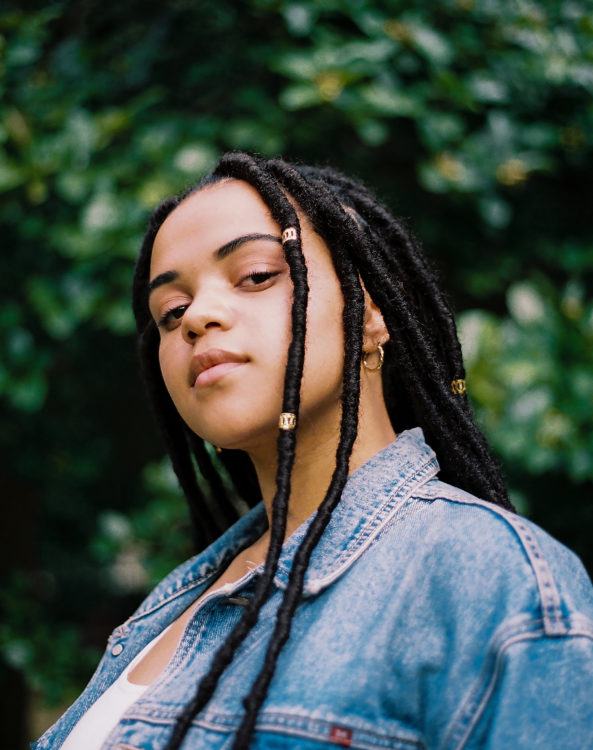
Ester
“I wish people would understand the difficulty we have to face sometimes. Even my own dad, who’s white, who has four mixed race children, doesn’t know much about our hair or how to manage it. He doesn’t understand the political side of black hair. He’s very open and understanding, and he’s willing to listen, but it just doesn’t hit home.
There’s only so much I can say to him. Growing up, he never really did me or my sisters’ hair, but now I have even younger siblings so I feel more strongly about it, because if there was ever a day where my mom wasn’t there, he wouldn’t know the first thing about managing their hair. So I’ll try to keep the conversation going, I’ll even do a demo on my little sister’s hair so he can watch and learn. But again, hair is something that’s so overlooked, people don’t see it as something that’s deep – but for black people it very much is, because it’s our reality.
My hair was relaxed for me without me knowing. I was dropped off at the hairdressers by my mom, and usually she would stay with me but this time she had to run some errands so she left me there. The women were telling me how difficult my hair was to manage, so suggested a treatment that would make it nice and slick. I saw the relaxer box and didn’t know what it was, I was 11 years old. I said “yea I really want this, the girl on the package looks cute!”. It was a terrible experience, my scalp was burning. They washed it out, and I was like “wait, my hair doesn’t look like the girl on the pack” and they said “of course not, you have to style it”. I felt scammed. My mom came back and she said “oh, did you relax her hair?” And she looked at me asking if I had wanted that, but I was 11 years old. I didn’t know what I wanted. I had relaxed hair until I was 16 years old, where I had half relaxed hair and half regrowth.
There’s a lot more that comes with black hair than the style, and looking “cool”. It’s weird that the hair on my head is political, but it is, and it shouldn’t be. Race is political. So with race, comes a certain hair type. There are certain hair types that are deemed more acceptable than others. In certain professions you can’t have braids, you have have your natural fro out. In school they told me I couldn’t have my natural hair out. I had to have it back. I didn’t know what else to do, I couldn’t be bothered to argue. I was passed the point of feeling the need to justify my existence. I didn’t want to cause trouble. Looking back, I should have defended myself, but I don’t regret the decision I made. Sometimes we’re just expected to protest and be ready to fight for our rights but I feel it’s not always our responsibility. Personally, I was exhausted, and I know that was the right choice for myself at the time. If it was me now, it’d be a different story.”
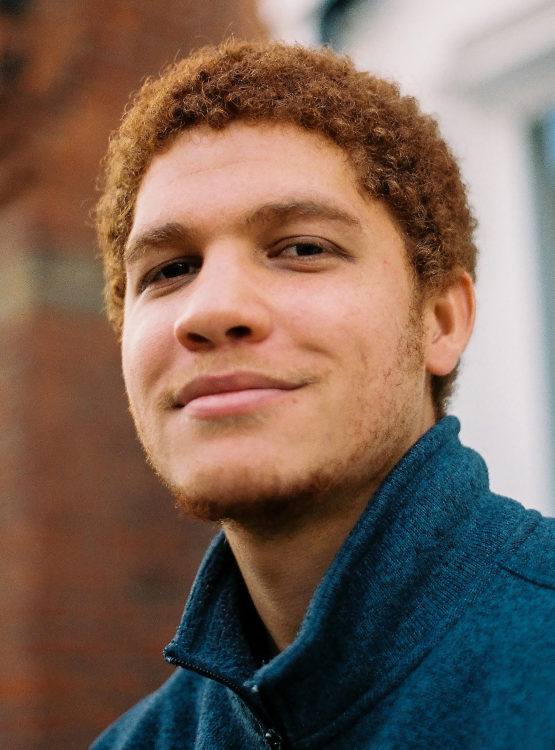
Hal
“My hair is a pretty integral part of my identity. It draws a lot of attention, which I get. I guess it’s not every day that you see a mixed guy with orange hair. People are always asking me if it’s my natural hair color. It’s super strange when people think I am albino though, which has happened pretty frequently. I don’t get offended but I just wonder if I really look that different to the point where people think I have pigmentation disorder. One time a guy in Australia, who was a music producer was willing to pay me to be in a music video because he said I had an “albino vibe” which was very “trendy” in the creative arts and media. It was super bizarre.”
Henrique
“Between my brothers and I, I’m the one with the lightest complexion & they used to make fun of my hair texture because apparently it’s the roughest between us. So I grew up being teased as ‘the light skin with rough hair’. Now, I feel like my hair texture is the best visual representation of my blackness – the only physical evidence I have to respond to the constant assumptions that I am mixed race, which isn’t what I identify as.”
Idy (my younger brother)
“At the moment my hair reminds me how patient I need to be at this stage of my life and therefore keeps me grounded, but I wouldn’t say that it represents my identity at all. My hair is just an accessory to my true identity.”
“What we need to understand is that people don’t think with their hair. Hair to me is just a means of expression and creativeness. Black hair is the most versatile and therefore gets the most attention, so it’s normal for it to get the most hate. We’ll deal with it with all its beauty though”
Johanna
“The way I do my hair will often dictate the way I feel and perceive myself. A shaved head will make me feel extremely sexy, cornrows will make me feel fierce and confident, long braids will make me feel more feminine and my natural afro will simply make me feel like my creative and dynamic self.” .
Korrol
“In school I tried different styles, but they just didn’t work – it got wackier and wackier. The wackiest was a period when I had long relaxed hair. Then I had it short, slicked back… at the time I thought it was nice but looking back now, it didn’t feel right. It was school so I felt I had to assimilate; it was me, my best mate and another guy – and then a sea of white. I went in one day with twists, and my teachers were like ‘that’s nice… but it’s a bit messy’. I was about 14 years old. I wasn’t asked to get rid of them, but the nuances were quite clear.”
Lara
“My hair was always really long growing up, but my dad would never let us relax it. No chemicals and always natural; I used to hate that because I wanted straight hair like everyone else. About a year and a half ago I wanted to do something different, so 3 years ago I just cut the back.
A year ago I decided I wanted to cut it all. I asked my mom ‘but what if it looks horrible!’ Since you can’t put hair back, and I don’t do wigs. So I was quite nervous, but when I cut it I wanted it cut, bleached and dyed all at once.
My hair now makes me feel really confident. I stand out a lot more which I really like. In the past I was happy just blending in the background, and ever since I cut my hair it’s been nice to be the only person sticking out, and people can notice me from miles away.”
Lavinya
“With my braids, I feel like I come across as ‘Mama Africa’, everyone wants to put their hands in my hair, people are fascinated by it, and in a predominantly white environment you don’t feel like your hair is professional enough. Hair of all different textures should be accepted. It grows from your head just like everybody else. We shouldn’t have to assimilate to be accepted.”
Lekhani
“My hair makes me feel like a queen, my Afro is my crown.
I haven’t always liked my hair. It has taken me many years to get to a place where I accept my natural hair for what it is. I think it was mainly because I didn’t know how to ‘handle it’. I used to always try to straighten my hair to fit in with the other girls at school so I guess you could say I used to wish I had straight hair. I didn’t like standing out and wanted to fit in After many years of growth, understanding and acceptance I know embrace my natural afro hair.
If I could have any hairstyle right now it would be colourful rainbow braids because it would brighten up these dark Winter nights. Also the acting industry is quiet at the moment so I could get away with rocking this style for some time.
I wish people would understand that black hair is political. We are judged constantly by the way we choose to wear our hair – at school, in the workplace ect. People make unnecessary comments and I wish they’d just keep quiet instead. Don’t get me wrong, I love a compliment but leave it at that.
My hair definitely represents my identity. It’s a part of who I am. I wrote a whole play about how I struggled with my hair and how accepting my afro hair led me to accepting and understand my identity.”
Loyce
“The latter half of my twenties have focused on unlearning – unlearning self-hate and negative self-talk, healing from intergenerational traumas, and embracing my identity. Exactly one year ago, I went natural. It is the single most powerful journey I have led myself on.
Do I still have a long way to go? Hell yes. I still have anxiety around letting people into this (truer) version of myself. I have let my hair dictate the friends I spend time with, based on how I think they’d perceive the change. But I’m learning to block out the noise and other people’s perceptions, and rather focusing on being authentic and truly comfortable in my own skin. Because what I feel inside will always reflect out – sometimes in the most mysterious of ways. Here’s to a lifelong journey of growth.”
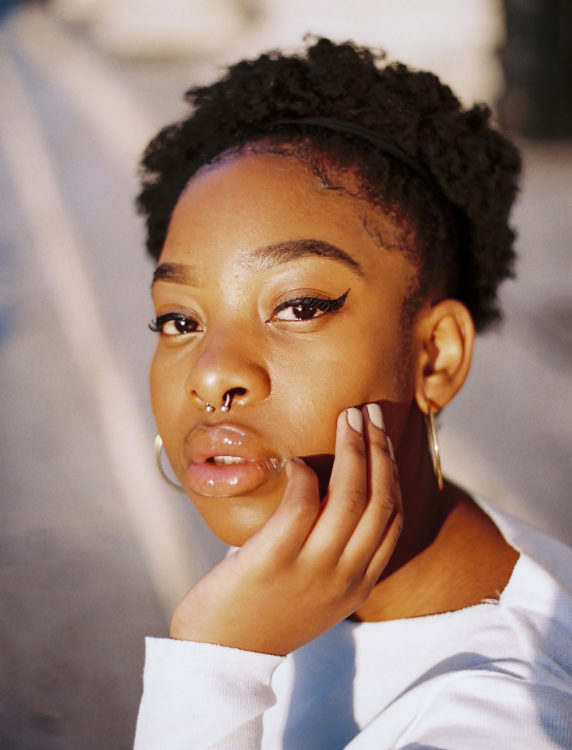
Medulla
“I used to watch these makeover shows where they would improve people’s appearances. If a black woman was on the show, for example, and she had her natural hair, the transformation would be to straight hair which subliminally would make me think that straight hair equates to beauty.”
Maryam
Growing up, the trend was straight hair. It was a real complex for me. All the girls around me had straight hair, and I was always the only one with curls.
Clara: “So, did you straighten your hair?”
Maryam: “No, never.”
“En grandissant, la tendance c’était les cheveux lisses. J’étais vraiment complexé par ça. Toutes les filles autour de moi avaient les cheveux lisses et j’étais toujours la seule avec des boucles.”
–”Donc, tu te lissais les cheveux?”
–”Non, non. Jamais.”
Mikhail
“My mom was a hairdresser. She was the one who originally did my hair. She really looked after me and wanted me to look nice. She didn’t have everything but that’s what she could do for me. When I was going through my ‘afro’ phase she was very against it. She wanted me to be in an environment where I could get a job. She was tough about looking a certain way so I could get ahead, and I completely understand where she was coming from. It’s a back and forth, but this was a hairstyle that we settled on, she was cool with it.”
Oumaïma
“I didn’t always have curly hair. I used to straighten my curls to fit in with society. Growing up in Morocco, most of the girls had straight long hair so I used to feel quite different. I couldn’t find any products that fit my curly needs and hairdressers would never waste too much time on me and would suggest to chemically relax instead. However, once I moved to the UK everything changed. I met people who showed me how to style my hair, which products to use and not use. It was one of the best feeling ever. Now I love my hair and I wouldn’t change it for anything.”
Pele
“I grew my afro out for about a year and a half. One day, my school in Costa Rica did a hair donation for Cancer Research, where they were auctioning off people’s hair. Those that could donate their hair would, but I couldn’t donate mine. In my case, the person who bid the highest got to shave my hair off. I had two of my ex-girlfriends bidding against each other, and I ended up getting the second highest bid in the school.”
“In Ghana, a lot of people aspire to have straighter hair and loser curls, instead of kinky hair. I feel I had ‘privileged’ hair. I was never made to feel like I wanted to change my hair, especially as a guy. I know girls had a different experience. A lot of half-Ghanaian, half-Japanese girls want to have really straight hair, being heavily influenced by Anime culture, especially when everyone in Japan has extremely straight hair.”
“I didn’t grown up doing a lot of hair care stuff. My mom’s Japanese, she didn’t know what to do with my hair. My dad’s Ghanaian. So I never learned al that stuff. With dreadlocks, they’re gonna do what they’re gonna do. Let them be. Take care of them, but you can’t be too bothered about how you want them to look. I’ve started to get more into dreadlock philosophy and self-love. Appreciation for being yourself. I feel my dreads have made me feel more free, so they match my personality.”
Susan
“I wore weaves for a while. It’s such a long process, but I loved having the length and versatility, but I also felt very restricted. I couldn’t get my hair wet and if the wind blew I had to make sure it wasn’t showing the hair underneath; there was this constant anxiety to make sure no one saw the edges. Once I finally got the courage to take off my weave and cut the relaxed ends off my hair, I didn’t recognise myself. I hadn’t seen my natural hair in about 20 years. After all these decades of chemicals in my hair, I thought ‘would my hair even go back to my natural curl pattern?’ Every time I walked by a car, I saw myself in the reflection but I didn’t see ‘me’. It freaked me out.”
“As black or mixed race women, hair is often associated with our beauty and thought of as a commodity. We’re taught to have it in a presentable way, with common jokes like ‘get your edges laid girl’ – but that’s just not me. I think it’s nice to know that my hair doesn’t define me. It was important to go through the process, and eventually reject the Western ideals of beauty, and actually embrace rather than try to assimilate with the crowds. Me having my hair out like this is me embracing every part of who I am, and being unapologetic about it. It announces me before I enter a space; it’s made me really proud.”
“From an early age I saw my hair as something to control and manage, and was unruly, huge and puffy. There wasn’t really that much in the media celebrating natural afro hair. I was really upset because I didn’t have the hair that a mixed girl is meant to have. I didn’t have perfect ringlets and loose curls. I was so angry at my mom, because I thought she was my opportunity to have that.
I’m now getting to this acceptance that this is me, to the point where where I wear my hair out like this at work, even if I’m in a corporate environment, or a job interview, this is how I am, and if you don’t like it, then I don’t want to work for a company like you. I’m not the kind of person to think “I need to tidy my hair and hide it away”. It hasn’t had a negative impact on my job prospects so far, but it’s also made me get to a stage where I’m more than just my hair.”
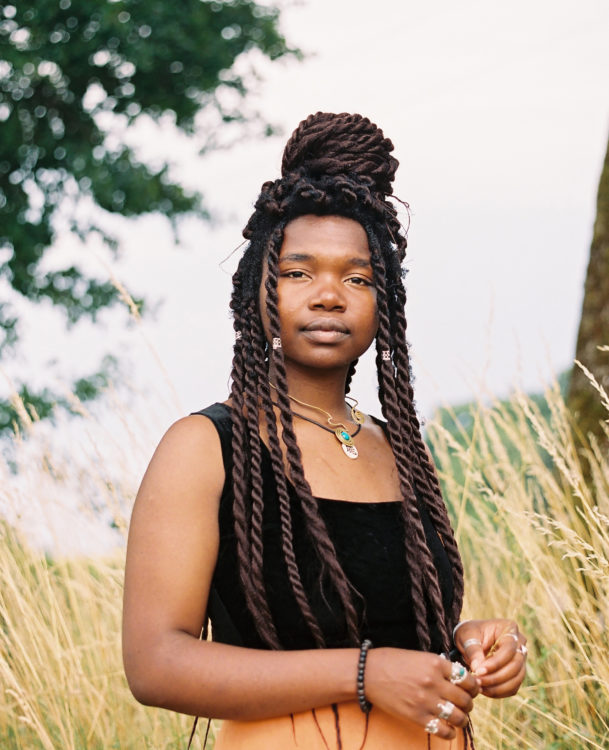
Tumtitu
“When I was young, I always had an ideal in mind; to have long, curly hair. I believed that’s what I needed to feel good in my own skin, which I know now has nothing to do with my happiness, really. I was inspired by my sisters, Esther and Rachel, who took such good care and appreciated their natural hair. However, gaining the self-confidence I have now was a deeply personal and independent journey.”
Udoka
“Detangling is awful, but we don’t need to talk about that!”
“I wish people loved their hair more. I wish mothers loved their daughters’ hair more, and didn’t feel the need to change it or straigthen it, because that’s where self-love comes from. If someone like your mom is trying to change you, then you’re automatically going to think there’s something wrong with you. My mom relaxed my hair when I was 4, so I never even realised that I could have an afro, I just thought that was my hair. Then I realised wait, I can look like Solange?!”


